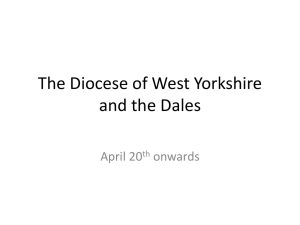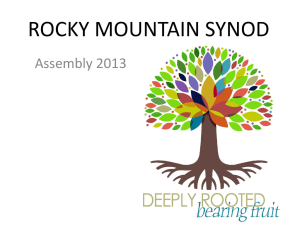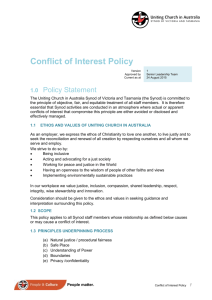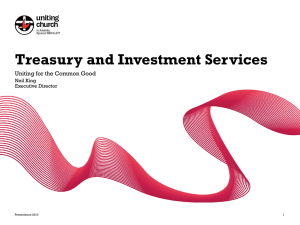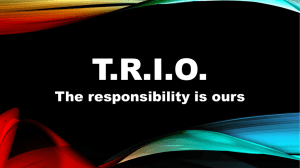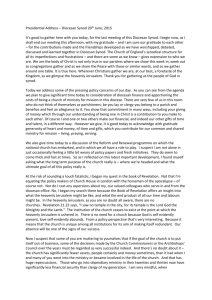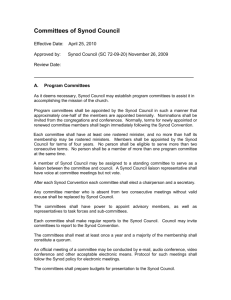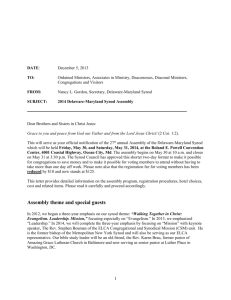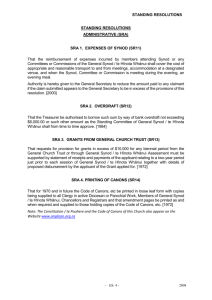General Synod July 2014 - Diocese of Southwell & Nottingham
advertisement
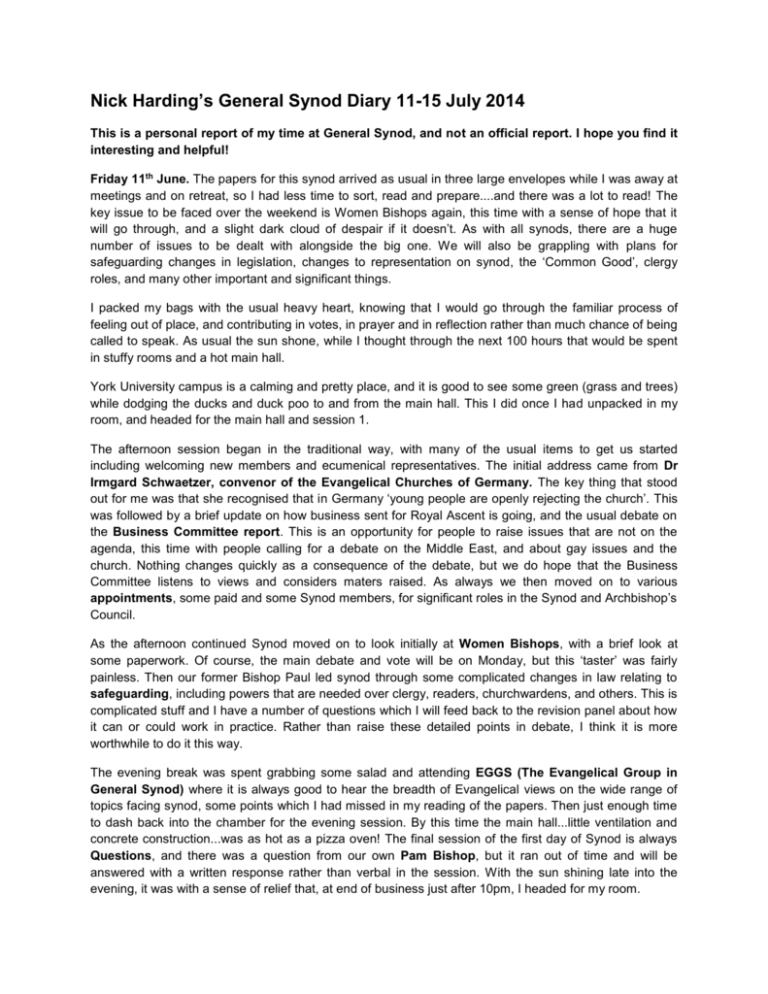
Nick Harding’s General Synod Diary 11-15 July 2014 This is a personal report of my time at General Synod, and not an official report. I hope you find it interesting and helpful! Friday 11th June. The papers for this synod arrived as usual in three large envelopes while I was away at meetings and on retreat, so I had less time to sort, read and prepare....and there was a lot to read! The key issue to be faced over the weekend is Women Bishops again, this time with a sense of hope that it will go through, and a slight dark cloud of despair if it doesn’t. As with all synods, there are a huge number of issues to be dealt with alongside the big one. We will also be grappling with plans for safeguarding changes in legislation, changes to representation on synod, the ‘Common Good’, clergy roles, and many other important and significant things. I packed my bags with the usual heavy heart, knowing that I would go through the familiar process of feeling out of place, and contributing in votes, in prayer and in reflection rather than much chance of being called to speak. As usual the sun shone, while I thought through the next 100 hours that would be spent in stuffy rooms and a hot main hall. York University campus is a calming and pretty place, and it is good to see some green (grass and trees) while dodging the ducks and duck poo to and from the main hall. This I did once I had unpacked in my room, and headed for the main hall and session 1. The afternoon session began in the traditional way, with many of the usual items to get us started including welcoming new members and ecumenical representatives. The initial address came from Dr Irmgard Schwaetzer, convenor of the Evangelical Churches of Germany. The key thing that stood out for me was that she recognised that in Germany ‘young people are openly rejecting the church’. This was followed by a brief update on how business sent for Royal Ascent is going, and the usual debate on the Business Committee report. This is an opportunity for people to raise issues that are not on the agenda, this time with people calling for a debate on the Middle East, and about gay issues and the church. Nothing changes quickly as a consequence of the debate, but we do hope that the Business Committee listens to views and considers maters raised. As always we then moved on to various appointments, some paid and some Synod members, for significant roles in the Synod and Archbishop’s Council. As the afternoon continued Synod moved on to look initially at Women Bishops, with a brief look at some paperwork. Of course, the main debate and vote will be on Monday, but this ‘taster’ was fairly painless. Then our former Bishop Paul led synod through some complicated changes in law relating to safeguarding, including powers that are needed over clergy, readers, churchwardens, and others. This is complicated stuff and I have a number of questions which I will feed back to the revision panel about how it can or could work in practice. Rather than raise these detailed points in debate, I think it is more worthwhile to do it this way. The evening break was spent grabbing some salad and attending EGGS (The Evangelical Group in General Synod) where it is always good to hear the breadth of Evangelical views on the wide range of topics facing synod, some points which I had missed in my reading of the papers. Then just enough time to dash back into the chamber for the evening session. By this time the main hall...little ventilation and concrete construction...was as hot as a pizza oven! The final session of the first day of Synod is always Questions, and there was a question from our own Pam Bishop, but it ran out of time and will be answered with a written response rather than verbal in the session. With the sun shining late into the evening, it was with a sense of relief that, at end of business just after 10pm, I headed for my room. Saturday 12th July. After an early breakfast and preparing papers and reports for the day I headed for the main hall and the day’s business, starting with worship. Then the Archbishop of York gave us the Presidential Address, focusing us on the need to choose life, including being obedient to God’s law and sharing blessings with others. A morning of detailed and partially dull legislation followed. We approved the details of enacting a collection of minor changes agreed last year, looked at the membership and work of the Standing Orders Committee, and approved some slight changes to the pensions measure. The morning got a little bogged down with the report on clergy and laity representation on General Synod, with amendments relating to the Diocese of Europe’s number of reps, University and theological experts and their election processes, and a little of the balance of the ‘north/south divide’. Tony Walker had been part of the group drafting this legislation, so sat on the platform taking notes. As usual, synod paused for fringe meetings at lunchtime. I attended a session concerning Cathedrals and new resources for interpreting them led by Dee Dyas, and based on work done by York University. There’s a good new CD available for use, which I hope to purchase for the Diocesan Resources Library at some point. The afternoon took a slightly unusual route, with a presentation on ‘The Uncommon Good’ leading us into group work and discussion. Jim Wallis, well-known in the USA as a Christian voice challenging power and materialism, spoke and challenged us to think differently and, both as the church and individuals, to think differently about the Common Good and the part we can play in serving and helping others. I found his talk interesting and a refreshing change, but others were less impressed. Then to small groups on a very hot afternoon in a painfully hot room, which didn’t really work for me. We were asked to respond to the talk with our initial thoughts, and then look at photographs, presented with quotes from Jim Wallis. After a while the group disbanded itself, affording me the opportunity to sit quietly for 30 minutes before the debate on the Common Good report. The debate gave people a bit of a ‘shop window’ to talk about things they are involved in, and as always it was wide-ranging and interesting. Evening worship was traditional (again) and led by members of the Church of England Youth Council....who had no input at all into the style or content of the worship. It is a source of frustration to me that, generally at Synod, worship represents only one style of the church’s engagement with God! I hadn’t booked in for a fringe meeting so had a salad for tea (the queue for hot food being huge!), and then got my papers together for the final session of the day. Over 10 years ago our diocese brought to General Synod a motion on relaxing the rules on the wearing of vestments (robes) for public worship. At the time it seemed that the timing was not right, but now, after an interesting debate ad a wide range of views, a similar motion from a cleric in London did the trick! Some people spoke passionately about why they wear robes, seemingly not quite understanding that noone is taking that away from them. The motion asks for the process to review and relax the rules, while leaving the current requirements in place for those who choose them, will see a final decision and change in Canon Law in about 2 years, and 3 debates to General Synod. Sunday 13th July. After breakfast I walked into York for Synod service in York Minster, with heat and slight rain on the way. The service was as usual a grand occasion, and good to sing ‘And Can it be’ with so many people in such a vast building! Jim Wallis preached, picking up the theme of ‘the common good’ as discussed at Synod the day before. After the service many of us from northern dioceses were invited for drinks, which took place in the Chapter House. Then the Southwell and Nottingham reps went out for lunch in York with Peter Hill, to wish him well as he leaves General Synod and the diocese to become Bishop of Barking. We all headed back to the University campus (some on foot and some in a taxi) to join debates on unfinished legislation around payments to the Churches Conservation Trust, along with the Archbishop’s Council Annual Report. This is always an interesting document, and worth getting off the C of E website and having a look at. The main work of the afternoon was a first look at new Additional Baptism Liturgies, which have already been tested in many parishes and adjusted by the House of Bishops. The debate was generally positive, with an acceptance that more accessible language is needed, although criticisms also flowed. Some people were concerned about certain words and phrases and there was much discussion about keeping reference to the ‘the devil’ in the text. The texts were sent for final revision, and are likely to be back before us in February 2015. This was followed by a presentation concerning the new Churches Mutual Credit Union, open to church workers and officers of the church. Lots of questions were asked, but I have to confess that the details were a bit beyond me! Worship was very different this evening, led by a curate from London, and encouraging people to pray freely and in threes. Great in itself, but like all of the readers and pray-ers in the service in the Minster, from London...and like all of the worship leaders in the Synod chamber apart from the Youth Council, clergy. Evening meal with others from our diocese, followed by a walk to a half-full chamber. Many people seemed to have decided to watch the World Cup Final instead of attending the debate on the Archbishop’s Council budget and spending for 2015. Canon John Spence, Chair of the Archbishop’s Council Finance Committee, spoke well and freely without notes, and thoroughly answered questions. Many speakers challenged minor points concerning planned spending and the need for joined-up thinking between the national church and dioceses. The votes, some of which were concerning huge amounts of money, went through. The final business of a long day was the annual Church Commissioners report. This presentation included a time for questions, with some people asking detailed and perceptive things about the work of the Commissioners and their investments. Pam Bishop asked a question, and got an incomplete answer, concerning the bonus culture in banking that is also present in the Commissioners! And so to bed – a long day revolving mostly around Women Bishops awaits. Monday 14th July. And so another sunny day began with skipping breakfast and then heading past the TV vans, cameras and news reporters into the chamber. Rather than simply getting on with the business of women Bishops we began with worship, again traditional and again clergy-led. Then we had an interesting debate around the need to support those who serve in the forces and their families. Various synod members shared their stories of relatives and friends who had served in the forces and the challenges they found. Churches need to be aware of those issues and support forces personnel and their families as much as possible. Then on to Women in the Episcopate, chaired by the Archbishop of York and spanning lunchtime. In the end around 63 speakers were called to contribute to the debate, 10 of whom were from the York Province....the north/south divide clearly at play again! The tone of the debate was quiet and generous, apart from towards the end when some of the more forceful opponents to the legislation became rather harsh and ungenerous. In the middle we paused for lunch, with the Archbishop leading us in an African song, and for me a fringe meeting with the Mental Health group on General Synod. Here we learned of a new series of books that are being produced by DLT and are part of the ‘Inclusive Church’ movement. Back to the debate, which towards 4pm became a little tired, with few fresh speeches apart from excellent speeches from John Spence and the Archbishop of Canterbury. Then to the votes on the legislation, including the key vote that had to be carried by a two-thirds majority in all houses, and it was. As we voted, and as the result came through, Sentamu made clear that it should be received in silence, but a few disrespectful and rude young female clergy in the public gallery chose to scream and cheer. Synod, and Sentamu, were not impressed! This was the last moment of Peter Hill being a rep from our diocese, as he left the chamber and headed down to his home...in London! Once all the processing of papers was completed we all stood, clapped, and sang ‘We are Marching in the Light of God’. Many saw this as an opportunity to march out of the chamber, leaving numbers rather thin for a debate on remembering and celebrating the 800th Anniversary of the Magna Carta, and to make the most of the freedoms it gives to all people. This was less than exciting, but the sort of debate that is needed to take the pressure off. The afternoon closing worship before the meal break was again traditional, and again clergy-led. Many people chose to go out to celebrate, go to bed, or go home at this point, and so the two evening matters were not well-attended. The first was the CHARM Scheme changes, adjusting the ways the church provides housing if required for retired clergy and their spouses. It was interesting to hear these plans, but I have issues about the generosity of the scheme compared to everyone else in society who do not get this level of help and low rents. I guess there is a fair balance to be got here, but we know that in many parishes in our diocese the clergy are not anywhere near the lowest paid parishioners and perhaps should make provision for their retirement home, as other people have to do! Then there was a presentation and questions from the Audit Committee, looking at the risk factors (financial, reputational, etc) that the church grapples with. There were some interesting questions, but synod was tired out, and the session fizzled out at just past 10pm. Back to my room via a drink with friends, packing, and preparing for the final morning, journey back to Jubilee House, and afternoon at my desk in the office. Tuesday 15th July An early start to put things in the car before breakfast, more Common Prayer worship with (for a change) a smattering of modern songs, and the morning of debates around some complicated legal stuff. The first business of the morning was to complete the legal work around decisions made on Friday regarding elections to Synod, and in particular the representation of Universities and Theological Colleges reps. Since decisions were made on Friday the legal team have done a great deal of work on the papers to present to us the legal documents for approval. The various papers were approved without much debate, and then we moved on to Ecclesiastical Property Measure. This was a more complicated piece of legislation relating to property belonging to the diocese and the parish, legal responsibilities, and who property is ‘vested’ in. Fortunately, there are people on synod who know and understand the detail of these matters, and various amendments were brought in order to make things more workable. One important but relatively minor bit of legislation was paving the way for Bishops to delegate responsibility for who can be deemed suitable to administer communion. This is in connection with our diocese motion that got first approval last year to make it possible for young people and adults who have not been confirmed to assist with administration of communion Synod ended in the traditional way, with some farewells to Bishops. As usual, a few Bishops are due to retire before Synod meets again in November, including the Bishop of Burnley, a long-standing proponent of the church’s engagement with the poor, and opponent of the ordination of women and women Bishops. Then the Archbishop ended the session formally at just after 1pm, and followed it with some prayers. So, after a long and hot, historical few days, with tensions and problems, drama and discussions, what do I think of Synod after this group of sessions? We have at last made a historic step forward in the progress to Women Bishops, a matter which has to return to synod for final approval in mid-November. We have done a lot of inward-looking around budgets, Commissioners, voting and representation. We have worked very hard – a working day of heavy debates and fringe meetings finishing well beyond 10pm is too long for many. Buy synod does do things on your behalf, and your reps do our best! Our best is generally not speaking, but contributing by asking questions, voting, and writing in when legislation is open for revision. I chatted to one member from a northern diocese at one point, who told me he had been on Synod since 1973 and had never made a speech. He commented that many speakers are ‘the same old wind-bags’ and whatever they may say, they and we all have only one vote. My worries include worship only being led by clergy, and most of the voices heard in all debates being from the southern dioceses. Whatever we say, it seems that the Church of England remains obsessed with clergy roles and profile, and is mostly about the South-East. The full details of all debates, motions, amendments and voting is available on the Church of England Website. The next General Synod will be four days in November in London, meeting at Church House and me staying at a Travelodge somewhere cheap!
